In myasthenia gravis (MG), first-line treatment for MG is acetylcholinesterase inhibitors which alleviates symptoms, but concomitantly may cause autonomic adverse effects.
In this study, we evaluated if symptoms of overactive bladder (OAB) are more frequent among MG patients than healthy controls.
Eighty-three MG patients and 50 healthy sex- and age-matched controls were included and answered the questionnaire “International Consultation on Incontinence Questionnaire Overactive Bladder Module” (ICIQ-OAB), including questions about polyuria, nocturia, urgency, and stress incontinence. Clinical severity of MG was determined based on three standardized clinical evaluations.
Compared to control subjects, MG patients had a higher total OAB score (median 5 [range 0-12] versus 3 [0; 7]) (p < 0.005) with higher scores concerning all four items. Also, MG patients had a higher bother score (10 [0-40] versus 5 [0-40]) (p < 0.05). Patients receiving a daily dose of pyridostigmine of more than 300 mg had a higher OAB score than other patients.
Myasthenia gravis patients have more bothering symptoms of OAB than healthy controls, related to the daily dose of pyridostigmine. To minimize adverse effects in patients with symptoms of OAB, the pyridostigmine dose should be as low as possible.
© 2021 John Wiley & Sons A/S. Published by John Wiley & Sons Ltd.
Overactive bladder in patients with myasthenia gravis-A cross-sectional population-based study.


